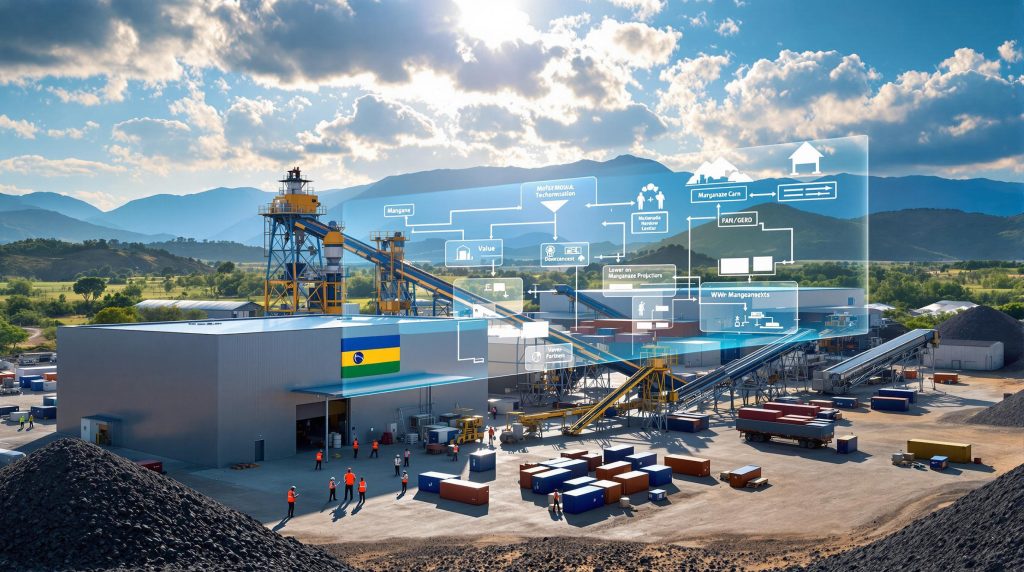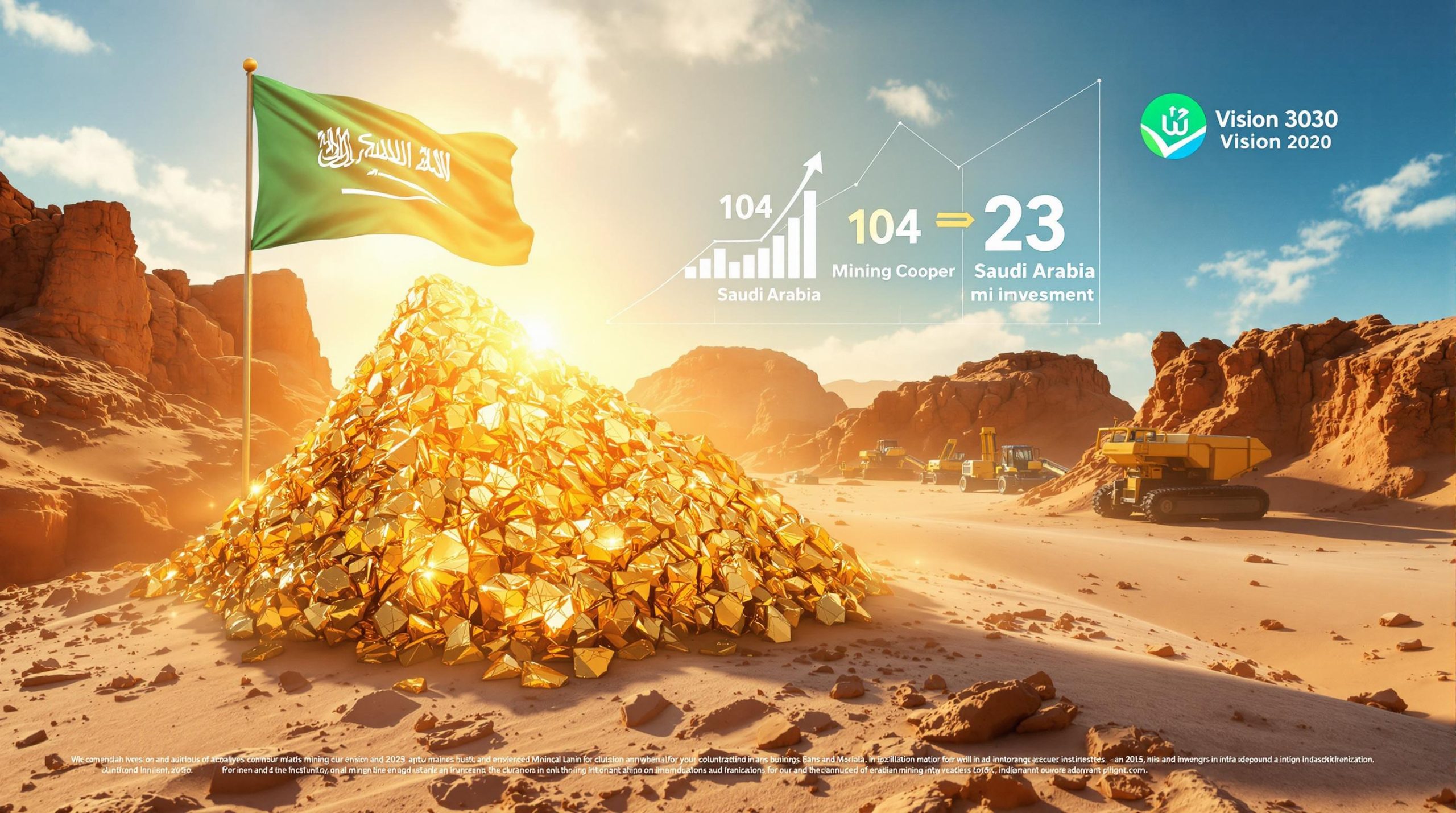Gabon's Manganese Processing Strategy: Eramet Responds to Export Ban
Gabon's resource sector is undergoing a significant transformation with the government's announcement of a complete ban on raw manganese exports starting January 2029. This strategic shift represents a pivotal moment for the West African nation as it joins other resource-rich countries in the region seeking to maximize the economic benefits from their natural resources through local processing and industrialization.
Understanding Gabon's 2029 Raw Manganese Export Ban
In late May 2025, the Gabonese government announced its decision to implement a complete ban on raw manganese exports effective January 2029. This policy gives mining companies approximately 3.5 years to adapt their operations and develop local processing capabilities, providing a crucial transition period for the necessary adjustments.
The ban specifically targets unprocessed manganese ore exports while potentially allowing processed forms to continue flowing to international markets. This distinction is critical for understanding how mining companies operating in the country must adapt their business models to remain compliant.
"Gabon's government announced at the end of May that it would ban the export of raw manganese from January 2029," according to a Reuters report published in Mining Weekly on August 12, 2025.
This policy shift aligns with a growing trend among resource-rich African nations looking to capture more value from their natural resources by moving up the value chain. Rather than simply exporting raw materials, these countries aim to develop domestic processing capabilities that create jobs, transfer technology, and generate higher economic returns.
Implementation Timeline and Framework
The 3.5-year transition window provides mining companies operating in Gabon a defined timeframe to make necessary investments in processing infrastructure. This gradual implementation approach demonstrates the government's understanding of the substantial capital investments and technical preparations required to develop processing capabilities.
During this transition period, companies can maintain their current export operations while simultaneously developing the required processing facilities. This approach attempts to balance the country's development goals with the practical realities of industrial transformation, allowing for a more orderly transition that minimizes disruption to both the companies and the global manganese supply chain.
Eramet's Strategic Response to Gabon's Export Ban
French mining group Eramet has moved quickly to position itself for success under the new regulatory framework, recognizing the strategic importance of adapting to Gabon's evolving resource policies.
New Executive Appointment Focused on Processing
In a clear response to the upcoming export restrictions, Eramet has appointed Clement Jakymiw as director of value chain transformation in Gabon. This newly created position signals the company's commitment to developing local processing capabilities that align with Gabon's industrialization goals.
According to Mining Weekly, "The company said in a statement that Clement Jakymiw would take up the new role of director of value chain transformation in Gabon, reporting to Castellari." This direct reporting line to CEO Paulo Castellari underscores the strategic importance Eramet places on this transformation initiative.
Jakymiw brings valuable operational experience to this role, having previously served as deputy chief operating officer overseeing manganese ore operations. This background provides him with intimate knowledge of Eramet's manganese business, positioning him well to lead the company's adaptation to the new regulatory environment.
Leadership Restructuring to Address New Challenges
Eramet's organizational restructuring extends beyond a single appointment, reflecting a comprehensive approach to addressing the challenges posed by the export ban. The creation of this new executive position dedicated specifically to value chain transformation demonstrates how seriously the company takes the need to evolve its business model in Gabon.
The transformation will likely require developing new capabilities in manganese processing, potentially including smelting operations to produce ferromanganese and silicomanganese alloys, electrolytic manganese metal production, or manganese chemical manufacturing for batteries and other applications.
CEO Paulo Castellari has personally engaged with Gabonese leadership on this issue, with Mining Weekly reporting that "Eramet Chief Executive Paulo Castellari said at the end of July that he had met Gabonese President Brice Oligui Nguema following the decision." This high-level engagement demonstrates the strategic importance of maintaining strong government relations during this transition period.
The Rationale Behind Gabon's Manganese Policy
Gabon's decision to implement the raw manganese export ban reflects broader economic development strategies aimed at reducing dependence on raw material exports while creating more diverse and sustainable economic opportunities.
Value Addition and Economic Diversification Goals
The export ban represents a clear policy shift toward value addition within Gabon's borders. By processing manganese locally before export, the country can capture a larger share of the value chain, potentially increasing government revenues and creating new industrial jobs.
Eramet's CEO Paulo Castellari acknowledged this motivation, stating: "This approach echoes the country's ambition for industrialisation and local processing and is part of the longstanding partnership that has united Eramet with Gabon, the Group's historic home for nearly thirty years."
This policy aligns with economic diversification efforts to reduce Gabon's vulnerability to commodity price fluctuations. By developing a more diverse industrial base centered around mineral beneficiation insights, the country aims to create more stable economic foundations less subject to the boom-and-bust cycles that often characterize raw material exports.
Regional Trend Toward Resource Nationalism
Gabon's policy is part of a broader regional trend, with the Mining Weekly article noting that Gabon is "joining other West African states in seeking to capture more value from their mining resources." This movement reflects growing assertiveness among resource-rich African countries seeking to maximize domestic benefits from their mineral wealth.
These policies indicate a shift in the balance of power between multinational mining companies and host governments, with African nations increasingly setting terms that prioritize domestic economic development over the traditional export-oriented extractive model.
The Strategic Importance of Gabonese Manganese
Understanding the significance of manganese mining in Gabon provides crucial context for appreciating the potential impact of the export ban on both the country and global markets.
Gabon's Position in Global Manganese Markets
"Gabon, also an oil exporter, holds some of the world's richest manganese deposits," according to Mining Weekly. This geological advantage has positioned the country as a strategically important supplier to global steel markets, where manganese is an essential input.
The country's high-grade ore is particularly valuable for steel production, where manganese serves as an essential alloying element that improves hardness, strength, and wear resistance. This high-quality resource gives Gabon significant leverage in implementing policies that reshape how its manganese reserves are exploited.
Eramet's Comilog Operations
Eramet's subsidiary Comilog is the primary operator of Gabon's manganese resources, with the Mining Weekly article noting that the country's manganese deposits are "primarily operated by Eramet's Comilog subsidiary, in which Gabon holds a minority stake."
This partnership structure, with the government maintaining a minority ownership position, has been a cornerstone of Gabon's mining sector for nearly three decades. The Comilog operations currently "processes some manganese locally but mostly exports its ore," highlighting the significant transformation required to fully comply with the upcoming export restrictions.
Challenges in Developing Local Processing Capabilities
The transition from primarily exporting raw ore to processing manganese locally presents significant challenges that mining companies operating in Gabon must overcome to successfully adapt to the new regulatory environment.
Investment Requirements for Processing Infrastructure
Developing processing capabilities will require substantial capital investments in new facilities. These investments include constructing and operating smelters, refineries, and other value-addition facilities capable of transforming raw manganese ore into higher-value products.
The scale of investment required will depend on the specific processing routes chosen, with options ranging from relatively simple beneficiation processes to more complex metallurgical operations producing refined manganese products. Companies will need to carefully evaluate which processing options offer the best balance of technical feasibility, market demand, and return on investment.
Technical and Logistical Considerations
Beyond financial investments, developing processing capabilities presents significant technical challenges. These include securing reliable energy supplies, which are critical for energy-intensive processing operations, building appropriate transportation infrastructure to move processed products to market, and developing or recruiting the skilled workforce needed to operate complex processing facilities.
Water management, environmental compliance, and waste disposal present additional technical challenges that must be addressed in the development of new processing facilities. These factors will significantly influence both the technical approach and the overall cost structure of manganese processing operations in Gabon.
Potential Global Market Implications
The transition period and eventual implementation of Gabon's export ban could have far-reaching implications for the global manganese market, affecting supply chains, pricing dynamics, and competitive positioning.
Supply Chain Considerations
Steel producers who source manganese from Gabon may need to adjust their supply chains as the country transitions from primarily exporting raw ore to offering processed manganese products. These adjustments could include developing new supplier relationships, adapting technical specifications to accommodate different product forms, or investing in alternative sources of supply.
The 3.5-year transition period provides some buffer for these adjustments, allowing steel producers and other manganese consumers time to adapt their procurement strategies and potentially secure long-term supply agreements that account for the changing product mix from Gabon.
Price Dynamics for Processed vs. Raw Manganese
The policy may influence global pricing dynamics between raw manganese ore and processed manganese products. As Gabon shifts its output toward processed forms, the global supply balance between raw and processed manganese may change, potentially affecting price relationships between different product categories.
Early adopters of processing capabilities may gain competitive advantages if they can establish efficient operations before the export ban takes full effect. This could create opportunities for companies like Eramet to strengthen their market position by developing processing expertise that differentiates their products in global markets.
Current State of Manganese Processing in Gabon
Understanding the baseline of existing processing capabilities provides context for the scale of transformation required to comply with the 2029 export ban.
Existing Processing Capabilities
According to Mining Weekly, Comilog currently "processes some manganese locally but mostly exports its ore." This indicates that while some processing infrastructure exists, it handles only a fraction of the company's total production volume.
The existing processing facilities will need significant expansion to accommodate the full production volume after the export ban takes effect. This expansion will likely require not just scaling up current operations but potentially developing entirely new processing routes to produce a broader range of manganese products.
Opportunities for New Processing Technologies
The policy creates incentives for companies to implement innovative processing technologies that maximize efficiency and minimize environmental impact. These could include more energy-efficient smelting processes, improved recovery rates for valuable metals, or technologies that reduce emissions and waste generation.
Implementing these advanced technologies could potentially establish Gabon as a center for advanced manganese processing, creating a competitive advantage through higher efficiency, better product quality, or improved sustainability transformation compared to processing facilities in other regions.
Gabon's Policy in the Context of African Resource Strategies
Gabon's manganese export ban represents part of a broader continental trend toward greater local value capture from mineral resources.
Comparison with Similar Policies in Other Countries
Several African nations have implemented or announced similar resource beneficiation policies in recent years. These include export restrictions, local content requirements, and processing mandates across various mineral sectors, all aimed at capturing more value domestically from the continent's abundant natural resources.
The specifics of these policies vary significantly, with some countries imposing immediate restrictions while others, like Gabon, opt for longer transition periods. These differences reflect varying assessments of the time required to develop local processing capabilities and the potential market disruptions that could result from abrupt policy changes.
Balancing Investment Attraction with Local Value Capture
Gabon's approach, with its extended implementation timeline, attempts to balance the need to maintain investor confidence while advancing national economic development goals. The 3.5-year transition period acknowledges the complexity of developing processing capabilities while signaling a firm commitment to the policy direction.
This balanced approach may help Gabon avoid some of the challenges faced by countries that have implemented more abrupt policy changes, which in some cases have led to reduced investment, legal challenges from mining companies, or unintended consequences for government revenues and employment.
FAQs About Gabon's Manganese Export Ban
When will Gabon's manganese export ban take effect?
The ban on raw manganese exports will come into force in January 2029, giving mining companies approximately 3.5 years from the May 2025 announcement to adapt their operations and develop local processing capabilities.
Who will be most affected by this policy?
Eramet's Comilog subsidiary, as the primary manganese producer in Gabon, will be most significantly affected by the export ban. The company will need to substantially increase its local processing capacity to maintain production levels once the ban takes effect.
What types of processing might be developed?
Potential processing options include manganese smelting to produce ferromanganese and silicomanganese alloys used in steel production, electrolytic manganese metal production for specialized applications, and manganese chemical production for batteries and other applications.
How might this affect steel producers globally?
Steel producers who source manganese from Gabon may need to adjust their supply chains and potentially adapt to receiving processed manganese products rather than raw ore. This transition could affect both the technical specifications of the manganese inputs they use and potentially the cost structure of their operations.
Disclaimer: This article contains forward-looking statements about market conditions, policy implementations, and company strategies. These statements involve risks and uncertainties, and actual outcomes may differ from those anticipated. Readers should conduct their own research and due diligence before making business or investment decisions based on this information.
Looking for the Next Big Mineral Discovery?
Discover why historic ASX mining discoveries generate substantial returns by exploring Discovery Alert's dedicated discoveries page, where their proprietary Discovery IQ model instantly identifies significant mineral discoveries, giving subscribers a crucial market advantage before news spreads to the wider market.




